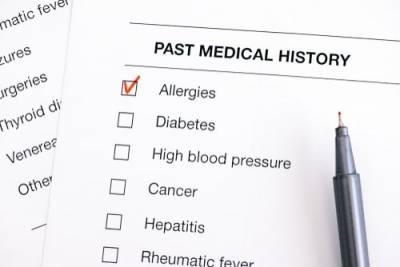
Patients Can Suffer Serious Injury or Death When Doctors Miss or Ignore Allergies in Medical Files
 Allergic reactions occur when the human body’s immune system is sensitive to a substance in food, medication, or the environment. Allergic reactions can be mild, but they can also be severe enough to kill someone. When doctors are treating patients with allergies, they need to pay close attention to whether the allergy is something to which a patient could be exposed during the course of treatment. When doctors are distracted, under the influence of drugs or alcohol, or negligent in their duties, patients can be exposed to allergens at the risk of their very lives. Anaphylactic shock, permanent organ damage, and wrongful death may occur when patients are administered improper medication or exposed to allergens in a hospital.
Allergic reactions occur when the human body’s immune system is sensitive to a substance in food, medication, or the environment. Allergic reactions can be mild, but they can also be severe enough to kill someone. When doctors are treating patients with allergies, they need to pay close attention to whether the allergy is something to which a patient could be exposed during the course of treatment. When doctors are distracted, under the influence of drugs or alcohol, or negligent in their duties, patients can be exposed to allergens at the risk of their very lives. Anaphylactic shock, permanent organ damage, and wrongful death may occur when patients are administered improper medication or exposed to allergens in a hospital.
Drug Allergies
Many people have drug allergies, most commonly to penicillin and other antibiotics. It can be very difficult to anticipate a drug allergy, as penicillin is the only drug allergy that can be reliably tested using a skin test. Unfortunately, research shows that patients often overreport non-confirmed drug allergies, potentially leading doctors to be skeptical of claimed drug allergies even when they are noted in patient charts. When administering drugs to which a patient is or may be allergic, medical caregivers must be on the alert for:
-
Rashes and hives
-
Breathing difficulties
-
Swelling and itching
-
Anaphylactic shock
Anaphylaxis is the most serious kind of allergic reaction. It causes a body’s immune system to release a flood of chemicals that cause a dangerous series of physical reactions. A patient’s blood pressure will suddenly drop, and breathing will become increasingly difficult. The pulse may weaken, the heart rate may rise dramatically, and the patient may experience nausea, vomiting, and rashes.
Environmental Allergies and Other Hospital-Acquired Hazards
Drugs are not the only substance that can trigger a dangerous allergic reaction in a patient. Hospital-acquired anaphylaxis is a serious problem that often presents in outpatient and inpatient settings alike. Many substances and environmental factors in hospitals may cause an allergic reaction, including:
-
Latex
-
Foods, including eggs, nuts, fish, and other animal proteins
-
Pollen from open windows
-
Diagnostic agents like medical dyes or contrast media
-
Blood products
Hospital-acquired anaphylaxis appears with the same symptoms as anaphylaxis in other situations. Unfortunately, patients being treated for other serious medical conditions may be unable to communicate or differentiate their anaphylaxis symptoms, making it difficult to diagnose and treat in time. Doctors must pay close attention to patients’ breathing and heart rate, as well as other signifiers of anaphylaxis. Failure to do so can result in permanent organ injury and death.
Contact a Cook County Medical Malpractice Lawyer
If you or a loved one have been seriously hurt or killed because a doctor failed to notice an allergy in your medical file, you may be able to recover compensation in a personal injury lawsuit. Contact a Glen Ellyn medical malpractice attorney with Schwartz Injury Law to schedule a free consultation and learn more about your options. Call us at 708-226-9000 today.
Source:
https://acaai.org/allergies/allergic-conditions/drug-allergies/
https://www.uspharmacist.com/article/hospital-acquired-anaphylaxis-41862
 Free Camp Lejeune Case Review
Free Camp Lejeune Case Review






